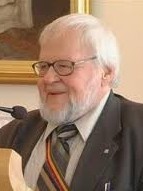-
(b.) - ?1932 July 08
Bio/Description
A Lithuanian born computer scientist, he is Professor and Director of the Dependable Computing and Fault-Tolerant Systems Laboratory in the Computer Science Department of the University of California in Los Angeles (UCLA), where since 1972 he has been Principal Investigator of continuing research projects on fault tolerant computing and system architectures, supported by about $ 4 million funding in grants from the U.S. Government, the State of California, and industry. He served as Chairman of the UCLA Computer Science Department from 1982 to 1985. He has supervised 27 Ph.D. dissertations, 30 M.S. theses, and is the author or coauthor of over 120 publications in these fields of study. He was born in Kaunas, Lithuania, but his family immigrated to the United States in 1950, settling in Chicago, Illinois. He attended the University of Illinois where he received his B.S. degree in 1954, his M.S. degree in 1955 in Electrical Engineering; and his Ph.D. in1960 in the field of Computer Science completing a Ph.D. thesis that devised the class of "signed-digit" number systems for fast digital arithmetic. From 1956 to 1960 he was associated with the Digital Computer Laboratory at the University of Illinois as a Research Assistant and Fellow, participating in the design of the ILLIAC II computer. His teaching and research interests are in computer system architecture, digital arithmetic, and fault-tolerant computing, especially software fault tolerance, fault-tolerant distributed system architectures, and design methodology for fault-tolerant systems. In 1960 he joined the Spacecraft Computers section of the Jet Propulsion Laboratory (JPL), California Institute of Technology, and initiated research on reliability of computing systems that originated the concept of "fault tolerance", first described in a paper presented at the 1967 Fall Joint Computer Conference. He organized and directed the JPL STAR research project from 1961 to 1972. This effort resulted in the construction and evaluation of the experimental JPL STAR (Self-Testing-And-Repairing) computer, for which, he received U.S. Patent No. 3, 517, 171, "Self-Testing and Repairing Computer" granted on June 23, 1970 and assigned to NASA. A paper that described the JPL STAR computer won the Best Paper selection of the IEEE Transactions on Computers in 1971. In 1969, JPL began designing a Thermoelectric Outer Planet Spacecraft, or TOPS (Voyager1 and Voyager2 missions). Outer planet missions ranged so far from the sun that solar cells would be inadequate. TOPS would carry radioisotope thermoelectric generators to provide electrical power. STAR was considered as the on-board computer for TOPS. Components built to STAR specifications later found their way into the NASA Standard Spacecraft Computer 1 (NSSC-1). He joined the University of California in Los Angeles (UCLA) Faculty in 1962 where he led the research laboratories. In addition to the administrative and scientific work he led the Department of Computer Science. He teaches courses in computer system architecture, computer arithmetic, fault-tolerant systems, and software fault tolerance. He is a Fellow of the IEEE Computer Society, and as a member, he founded and was the first Chairman of the Technical Committee on Fault-Tolerant Computing (1969-1973), and was the organizer and General Chairman of the First International Symposium on Fault-Tolerant Computing in 1971. He also served for four years (1971-1974) as a member of the Governing Board of the IEEE Computer Society. In international activities, he has served as the founding Chairman of the Working Group 10.4 on "Reliable Computing and Fault Tolerance" of the International Federation for Information Processing (IFIP) from 1980 to 1986. He is the recipient of the annual IEEE Computer Society Technical Achievement Award in 1985, and the IFIP Silver Core Award in 1986. He is also the recipient of the 1979 AIAA Information Systems Award, and the 1980NASA Exceptional Service Medal. He has lectured and conducted joint research at the National Polytechnic Institute of Mexico, the University of Sao Paulo, Brazil, the Laboratoire d'Automatique et d'Analyse des Systemes (LAAS) in Toulouse, France, Keio University in Tokyo, Japan, the Innovative Computer Systems Center of the Technical University of Berlin, ERG, and the Microelectronics Research Institute in Lintong, Peoples' Republic of China. In 1974 he spent a five-month research visit, sponsored by the U.S. National Academy of Sciences, at the Institute of Mathematics and Cybernetics of the Lithuanian Academy of Science in Vilnius, Lithuania, where he also had made six shorter research visits since 1968. From August, 1990 to February 1993, he served as the first Rector of the Vytautas Magnus University if Kaunas, Lithuania after it was reopened in 1989. The university is the former National University of Lithuania,' established in 1922 and closed by the Soviet government in 1950. The Senate of Vytautas Magnus University awarded him the title of Professor Honoris Causa in 1994. He is also the President of A. Avizienis and Associates, Inc., a consulting firm specializing in dependable computing and fault-tolerant system design.
-
Date of Birth:
1932 July 08 -
Noted For:
Organizer and director of the JPL STAR research project from 1961 to 1972 which effort resulted in the construction and evaluation of the experimental JPL STAR (Self-Testing-And-Repairing) computer -
Category of Achievement:
-
More Info:


